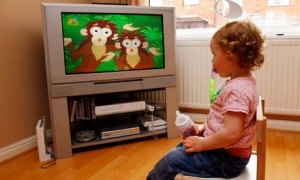 According to the Forum on Child and Family Statistics approximately sixty percent of children under the age of six were enrolled in some type of child-care program in 2010.
According to the Forum on Child and Family Statistics approximately sixty percent of children under the age of six were enrolled in some type of child-care program in 2010.Child-care programs must meet the social, emotional, physical, cognitive and language developmental needs of children. The ways in which a caregiver communicates and interacts with children determines, in large part, how well a program meets those needs.
Considering these statistics some children will spend majority of their time in the care of secondary attachment figure in a center or at home. With this information, it is essential to take into account the lasting impact caregivers have on the lives of our children. When hiring a caregiver it is necessary to find a person that will respect our children in the same manner we do. It is especially important to make certain there is a real connection between your child and the caregiver. The measure of quality in care-giving should be based on the concept of goodness of fit for each individual child. The relationship between the carer and your child contributes in a great degree to their emotional development, which, will affect a child throughout their entire life.
How does a parent accomplish the difficult task of finding the right caregiver/child fit? How can we make certain that the person hired is the right person?
Caregiver -to-child interaction is as much an exercise in social skills for the child, as it is a valuable learning experience. A caregiver should not ignore your child by, for example, sitting them in front of the television for extended periods of time. Many research studies have proven that human to human interaction has a profound effect on the development of a child at the neurological level.
Usually, parents are the child’s first primary care givers. When a new person is about to become a part of a child’s life we must allow time for smooth transitions. Parents must be present during those important first encounters between the child and caregiver. The chosen person should be able to interact with the child as with any other person. These interactions should take place in a loving and relaxed environment with loving and relaxed relationships. This way, they contribute to emotional and intellectual development of the child.
The best opportunities to create this environment and build their relationship is through daily routines, such as those involving the child directly, as well as, the interaction the child observes. When the relationships between the parents and care givers (family members, friends, etc.) are based on respect, then that is exactly what they will be modeling to their child. They will learn to trust this person at their own pace, and in his own way.
Picking the right person can be a long and tedious process that involves substantial research and interaction between yourself and the caregiver. This should happen long before introducing the caregiver to your child. Changing caregivers often will only result in confusion and instability for the child and the whole family.
When choosing the right person, parent’s must feel confident with their choice and they should genuinely consider the child’s opinion.
The person most affected by the caregiver’s ability or inability to bond and meet the needs of the child will be the child. According to the many studies, this effect can be felt at even the neurological level. For this reason choosing the right caregiver is a decision that should be taken very seriously.
.
.
“Our social interactions even play a role in reshaping our brain through ‘neuroplasticity’ which means that repeated experiences sculpt the shape, size, number of neurons and their synaptic connections. By repeatedly driving our brain into a given register, our key relationship can gradually mold certain neural circuitry. In effect, being chronically hurt and angered, or being emotionally nourished, by someone we spend time with daily over the course of the year can refashion our brain” – Daniel Goleman, Ph.D.
.
.
References:
Brazelton, T. Berry Ph.D, The Irreducible Needs of the Children
Goleman, Daniel, Ph.D., Social Intelligence
Jones, Elizabeth & Prescott, Elizabeth. Dimensions of Teaching/II. Focus on Day Care
Konner, Melvin, The Evolution of Childhood
.

No comments:
Post a Comment